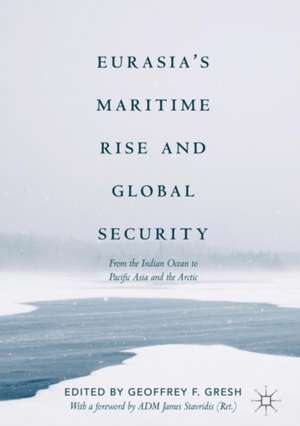Eurasia’s Maritime Rise and Global Security: From the Indian Ocean to Pacific Asia and the Arctic: Palgrave Studies in Maritime Politics and Security
Editat de Geoffrey F. Greshen Limba Engleză Hardback – 16 apr 2018
| Toate formatele și edițiile | Preț | Express |
|---|---|---|
| Paperback (1) | 1378.72 lei 43-57 zile | |
| Springer International Publishing – 29 dec 2018 | 1378.72 lei 43-57 zile | |
| Hardback (1) | 1388.53 lei 43-57 zile | |
| Springer International Publishing – 16 apr 2018 | 1388.53 lei 43-57 zile |
Preț: 1388.53 lei
Preț vechi: 1693.34 lei
-18% Nou
Puncte Express: 2083
Preț estimativ în valută:
265.78€ • 288.79$ • 223.40£
265.78€ • 288.79$ • 223.40£
Carte tipărită la comandă
Livrare economică 21 aprilie-05 mai
Preluare comenzi: 021 569.72.76
Specificații
ISBN-13: 9783319718057
ISBN-10: 3319718053
Pagini: 300
Ilustrații: XXIII, 288 p. 8 illus., 3 illus. in color.
Dimensiuni: 148 x 210 mm
Greutate: 0.66 kg
Ediția:1st ed. 2018
Editura: Springer International Publishing
Colecția Palgrave Macmillan
Seria Palgrave Studies in Maritime Politics and Security
Locul publicării:Cham, Switzerland
ISBN-10: 3319718053
Pagini: 300
Ilustrații: XXIII, 288 p. 8 illus., 3 illus. in color.
Dimensiuni: 148 x 210 mm
Greutate: 0.66 kg
Ediția:1st ed. 2018
Editura: Springer International Publishing
Colecția Palgrave Macmillan
Seria Palgrave Studies in Maritime Politics and Security
Locul publicării:Cham, Switzerland
Cuprins
1. Introduction: Why Maritime Eurasia?.- 2. Strategic Maritime Chokepoints: Perspectives from the Global Shipping and Port Sectors.- 3. Chokepoints of the Western Indian Ocean, China’s Maritime Silk Route, and the Future of Regional Security.- 4. The Economics of Somali Counterpiracy: Assessing Counterpiracy Measures for International Shipping Companies.- 5. The Rise of an Indo-Japanese Maritime Partnership.- 6. The Fastest Way Across the Seas: Cyberspace Operations and Cybersecurity in the Indo-Pacific.- 7. Forgotten Borders: Japan’s Maritime Operations in the Korean War and Implications for North Korea.- 8. Blurred Lines: Twenty-First Century Maritime Security in the South China Sea.- 9. Sea Level Rise in the Pearl River Delta.- 10. The Great Convergence: Maritime Supremacy, Energy Primacy, and the Oceanic Coalition in Asia.- 11. The Coming Arctic Boom: As the Ice Melts, the Region Heats Up.- 12. Public and National Imagination of the Arctic.- 13. Arctic Fisheries Management in the Twenty-First Century.- 14. Security Competition Rising: Renewed Militarization of the High North.- 15. Tackling Greenhouse Gas Emissions from the International Maritime Industry.
Notă biografică
Geoffrey F. Gresh is Department Chair and Associate Professor of International Security Studies at National Defense University in Washington, D.C.
Textul de pe ultima copertă
This book explores Eurasia’s growing embrace of its maritime geography from the Indian Ocean to Pacific Asia and the Arctic. In an age of climate change, the melting of the Arctic will transform Eurasia’s importance, in addition to influencing the political, economic, and military dynamics across Eurasia’s main maritime regions. These emerging shifts have already begun to alter maritime trade and investment patterns, and thus the global political economy. It also creates a rising threat to the current status quo of world order that has long been dominated by the Atlantic World. This edited volume showcases some of the world’s leading experts and examines Eurasia from a saltwater perspective, analyzing its main maritime spaces in a threefold manner—as avenue, as arena, as source—to show the significance of this geostrategic change and why it matters for the future of the world’s oceans.
Geoffrey F. Gresh is Department Chair and Associate Professor of International Security Studies at National Defense University in Washington, D.C.
Caracteristici
Portrays a complex dynamic across Eurasia’s maritime regions that will continue to evolve and grow more accentuated with global warming Provides keen insights into how Eurasia’s maritime space has transformed in recent years, in addition to how it will affect many of the current dynamics and alliances Discusses how Eurasia's contested maritime space creates a rising threat to the current status quo of world order that has long been dominated by the Atlantic World and the United States specifically








